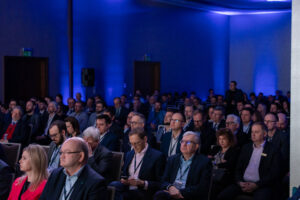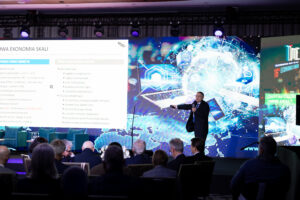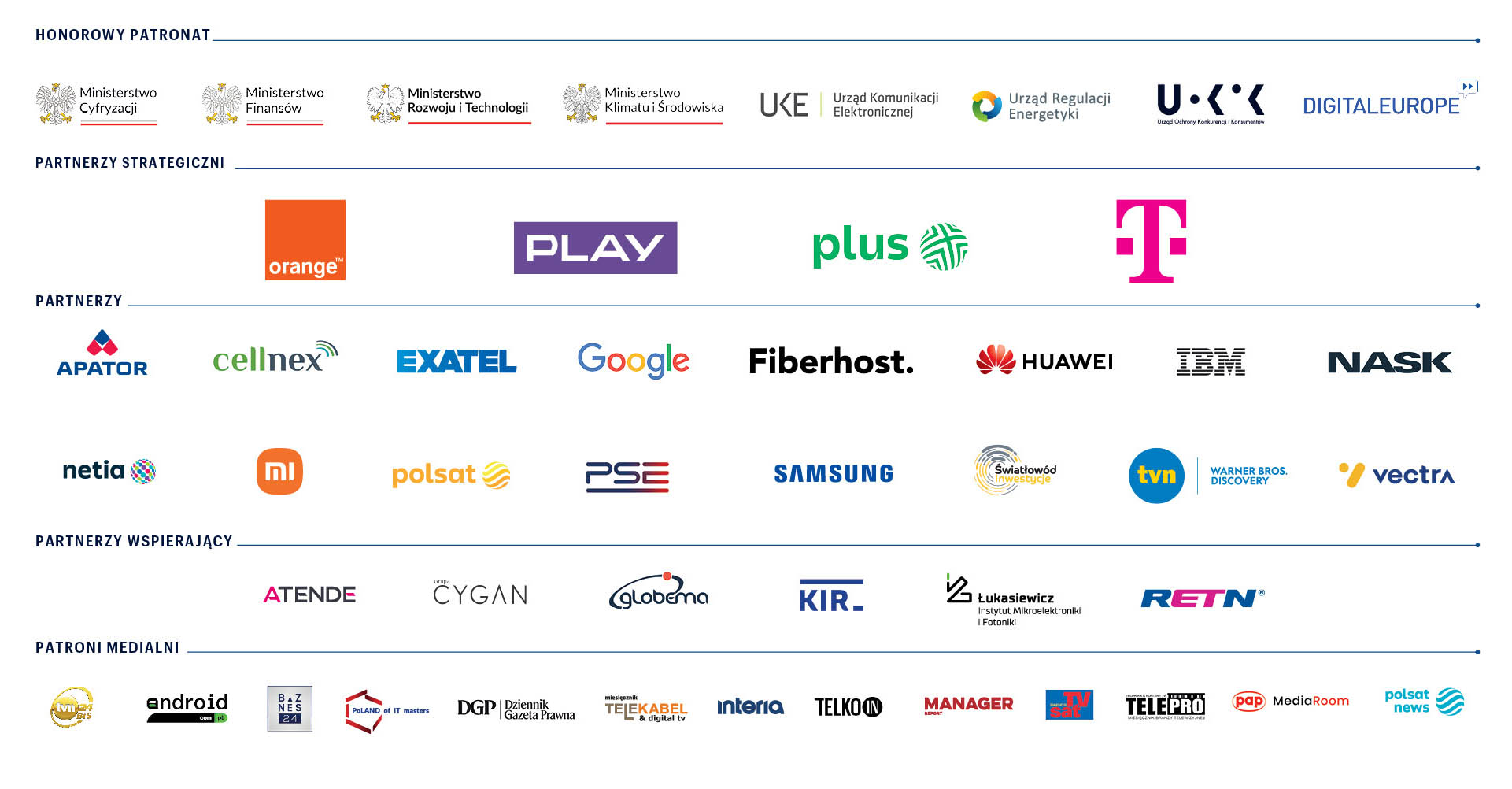Forum Gospodarcze TIME „Cyfrowa Dekada 2030”: Nowe Rozdanie, stare problemy, otwartość i współpraca
 W dniach 11-12 marca br. odbyło się zorganizowane już po raz 16 najważniejsze w naszym kraju coroczne spotkanie ludzi i firm związanych z technologiami ICT – Forum Gospodarcze TIME. W Forum udział wzięło kilkudziesięciu prelegentów i panelistów oraz ponad 1200 uczestników, w tym ponad 500 on-line, reprezentujących instytucje centralne, izby i samorząd gospodarczy, uczelnie, liczne fundacje i stowarzyszenia. Odbyło się łącznie 35 specjalistycznych sesji. Trzeba do nich dodać wiele równoległych spotkań w mniejszych gronach, a co najważniejsze – moc ożywionych rozmów prowadzonych indywidualnie w kuluarach Forum. W rzeczy samej wszyscy – i na scenie głównej, na spotkaniach zamkniętych i w kuluarach – odnosili się do wiodącego tematu Forum: wyzwań „Cyfrowej Dekady 2030” i dochodzeniu do jej celów w nowych realiach politycznych naszego kraju – Nowego Rozdania.
W dniach 11-12 marca br. odbyło się zorganizowane już po raz 16 najważniejsze w naszym kraju coroczne spotkanie ludzi i firm związanych z technologiami ICT – Forum Gospodarcze TIME. W Forum udział wzięło kilkudziesięciu prelegentów i panelistów oraz ponad 1200 uczestników, w tym ponad 500 on-line, reprezentujących instytucje centralne, izby i samorząd gospodarczy, uczelnie, liczne fundacje i stowarzyszenia. Odbyło się łącznie 35 specjalistycznych sesji. Trzeba do nich dodać wiele równoległych spotkań w mniejszych gronach, a co najważniejsze – moc ożywionych rozmów prowadzonych indywidualnie w kuluarach Forum. W rzeczy samej wszyscy – i na scenie głównej, na spotkaniach zamkniętych i w kuluarach – odnosili się do wiodącego tematu Forum: wyzwań „Cyfrowej Dekady 2030” i dochodzeniu do jej celów w nowych realiach politycznych naszego kraju – Nowego Rozdania.
Strategiczny obszar tego wyzwania i środków do jego osiągnięcia przedstawił na rozpoczęciu Forum Wicepremier, Minister Cyfryzacji Krzysztof Gawkowski. Wskazywał na cyfryzację kraju „jako konieczne zmiany horyzontalne i proces, którego autorami są zarówno nasi poprzednicy, jak i ich obecni i przyszli kontynuatorzy. Ważne, by były to działania prowadzone transparentnie i we współpracy wszystkich środowisk działających dla osiągnięcia uzgodnionych, społecznie akceptowanych w kraju i Unii Europejskiej celów”.
Aspekt współpracy i otwartości na konsultacje był wielokrotnie przypominany także podczas kolejnych sesji, poświęconych wybranym, najważniejszym problemom podnoszonym przez nasze środowisko i branże. Platformą do tego rodzaju ciągłych aktywności będzie Rada ds. Cyfryzacji, funkcjonująca przy Ministrze Cyfryzacji, o czym mówiła i zachęcała do współpracy z nią obecna Przewodnicząca tej rady Agnieszka Jankowska.
A problemów do przeanalizowania na nowo i możliwie najlepszego szybkiego rozwiązania cały nasz sektor ma wiele. Te najważniejsze staraliśmy się przedstawić i kompetentnie choć z konieczności skrótowo naświetlić w gronie ekspertów już podczas tegorocznego Forum. Przypomnijmy najważniejsze z nich. Kwestie regulacyjne to te już nieco przeterminowane jak Krajowy System Cyberbezpieczeństwa i Prawo Komunikacji Elektronicznej, oraz aktualne jak np. Digital Services Act i Digital Markets Act czy funkcjonowanie krajowych regulatorów. Problemem są jak zawsze inwestycje w telekomunikację i te wynikające z modernizacji sektora energetycznego i jego bezpieczeństwa, rozproszenia, dostosowania do nowych standardów klimatycznych, wprowadzenia nowych modeli biznesowych i zasad rozliczeń finansowych z przemysłem i klientami indywidualnymi.  Kwestie technologiczne to oczywiście rozwój usług chmurowych w naszym kraju, ale i dominujący w dyskursie społecznym i biznesowym temat Sztucznej Inteligencji, jej zalet, niebezpieczeństw, regulacji, rozwoju w naszym kraju połączonego z aspiracjami do bycia liderem w tym zakresie. Telekomunikacja, jako fundament informatyzacji i cyfryzacji, rozwoju usług dla biznesu i ogółu obywateli to oczywiście temat i krąg wielu poszczególnych problemów, a zatem sam w sobie był analizowany w dedykowanych mu sesjach lub się przewijał w wielu innych. Kolejne z nich dotyczyły problemów cyberbezpieczeństwa w wielu jego aspektach, nowoczesnych finansów, współpracy nauki i biznesu, rynku medialnego, cyfrowych kompetencji i cyfrowej higieny, cyfrowego zdrowia, a nawet polskiego sektora kosmicznego.Zgodnie z ustaleniami i zaleceniami Rady Programowej Forum staraliśmy się w gronie prelegentów i ekspertów mówić o istotnych dla nas sprawach, z istoty swej trudnych i skomplikowanych, możliwie językiem najprostszym. Chcemy w ten sposób docierać z wiedzą o nich i sposobach ich prowadzenia w najbliższej przyszłości do jak największej części naszego społeczeństwa, a tym samym pozyskiwać jego aprobatę dla wagi tych zagadnień i zrozumienia ich grupowych i osobistych korzyści czy to w bliższej, czy dalszej przyszłości. Komunikacji z uczestnikami Forum, zwłaszcza tymi nieobecnymi stacjonarnie, służyło także po raz pierwszy uruchomione w tej skali podczas FG TIME studio telewizyjne, w którym odbyło się kilkadziesiąt rozmów prowadzonych przez dziennikarzy z występującymi na scenie głównej Forum panelistami i ekspertami. W ten sposób, niejako w pigułce, przekazywaliśmy natychmiast naszym widzom relacje można powiedzieć z pierwszej ręki z tego, co się działo i o czym rozmawiamy na Forum czy to w panelach czy na hotelowych korytarzach.
Kwestie technologiczne to oczywiście rozwój usług chmurowych w naszym kraju, ale i dominujący w dyskursie społecznym i biznesowym temat Sztucznej Inteligencji, jej zalet, niebezpieczeństw, regulacji, rozwoju w naszym kraju połączonego z aspiracjami do bycia liderem w tym zakresie. Telekomunikacja, jako fundament informatyzacji i cyfryzacji, rozwoju usług dla biznesu i ogółu obywateli to oczywiście temat i krąg wielu poszczególnych problemów, a zatem sam w sobie był analizowany w dedykowanych mu sesjach lub się przewijał w wielu innych. Kolejne z nich dotyczyły problemów cyberbezpieczeństwa w wielu jego aspektach, nowoczesnych finansów, współpracy nauki i biznesu, rynku medialnego, cyfrowych kompetencji i cyfrowej higieny, cyfrowego zdrowia, a nawet polskiego sektora kosmicznego.Zgodnie z ustaleniami i zaleceniami Rady Programowej Forum staraliśmy się w gronie prelegentów i ekspertów mówić o istotnych dla nas sprawach, z istoty swej trudnych i skomplikowanych, możliwie językiem najprostszym. Chcemy w ten sposób docierać z wiedzą o nich i sposobach ich prowadzenia w najbliższej przyszłości do jak największej części naszego społeczeństwa, a tym samym pozyskiwać jego aprobatę dla wagi tych zagadnień i zrozumienia ich grupowych i osobistych korzyści czy to w bliższej, czy dalszej przyszłości. Komunikacji z uczestnikami Forum, zwłaszcza tymi nieobecnymi stacjonarnie, służyło także po raz pierwszy uruchomione w tej skali podczas FG TIME studio telewizyjne, w którym odbyło się kilkadziesiąt rozmów prowadzonych przez dziennikarzy z występującymi na scenie głównej Forum panelistami i ekspertami. W ten sposób, niejako w pigułce, przekazywaliśmy natychmiast naszym widzom relacje można powiedzieć z pierwszej ręki z tego, co się działo i o czym rozmawiamy na Forum czy to w panelach czy na hotelowych korytarzach.
Czas na krótkie podsumowanie.
Po pierwsze FG TIME po raz kolejny potwierdziło, jak w naszym środowisku, firm z oczywistych powodów z reguły wobec siebie konkurencyjnych, istotne jest osobiste spotkanie pracujących w nich ludzi, zazwyczaj o wieloletnim stażu i bogatym doświadczeniu zawodowym, administracyjnym i menedżerskim, ale chcących wspólnie działać dla dobra swoich firm, urzędów, izb gospodarczych, instytucji, uczelni, stowarzyszeń, jednakże z celem nadrzędnym – dla dobra kraju.Po drugie podczas tegorocznego Forum dominowało optymistyczne przekonanie, że nawet w odniesieniu do niektórych starych problemów, jak np. zapóźnienie w akceptacji prze nasz kraj niektórych regulacji prawnych, a także tych zawsze istotnych jak dysponowanie odpowiednio dużymi środkami finansowymi, w otwartości do współpracy i faktycznego partnerstwa wszystkich stron leży klucz do zdynamizowania cyfryzacji w naszym kraju. Pierwszym sprawdzianem tych działań powinno być zapowiedziane przez Wicepremiera. Ministra Cyfryzacji przygotowanie przez resort do końca pierwszego półrocza zaktualizowanej strategii cyfryzacji Polski. Nowe – polityczne – Rozdanie w zakresie informatyzacji kraju, wsparte merytorycznym wkładem tegorocznego Forum Gospodarczego TIME, ma szansę stać się faktem. Po trzecie kilkunastu organizatorów Forum na czele z jego inicjatorem i głównym realizatorem czyli Krajową Izbą Gospodarczą Elektroniki i Telekomunikacji ma prawo do poczucia satysfakcji z po raz kolejny wykonanej dobrze pracy na rzecz swoich członków i całego środowiska.
Po trzecie kilkunastu organizatorów Forum na czele z jego inicjatorem i głównym realizatorem czyli Krajową Izbą Gospodarczą Elektroniki i Telekomunikacji ma prawo do poczucia satysfakcji z po raz kolejny wykonanej dobrze pracy na rzecz swoich członków i całego środowiska.
Po czwarte już teraz deklarujemy, iż Forum Gospodarcze TIME w marcu 2025 roku dokona solidnego przeglądu tematów, problemów, obietnic i przede wszystkim realizacji głoszonych deklaracji w obszarze cyfryzacji naszego kraju. Niekoniecznie musimy zawsze i wszędzie być liderami, ale z całą pewnością musimy nie tylko zahamować proces zaistniałych w ostatnich latach opóźnień w określonych dziedzinach, ale przede wszystkim przyspieszyć w doganianiu tych, co liderami w informatyzacji i cyfryzacji w obrębie co najmniej Unii Europejskiej już są.

